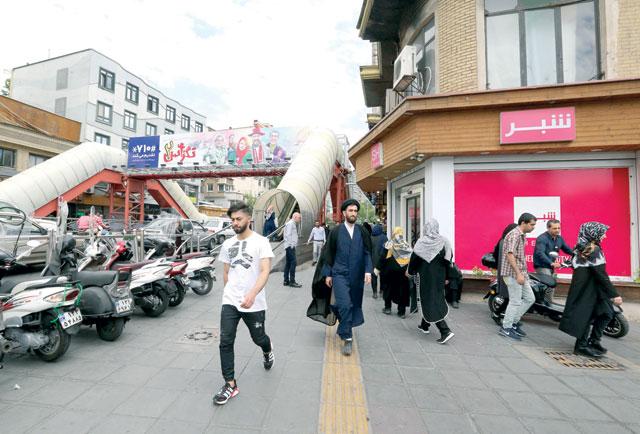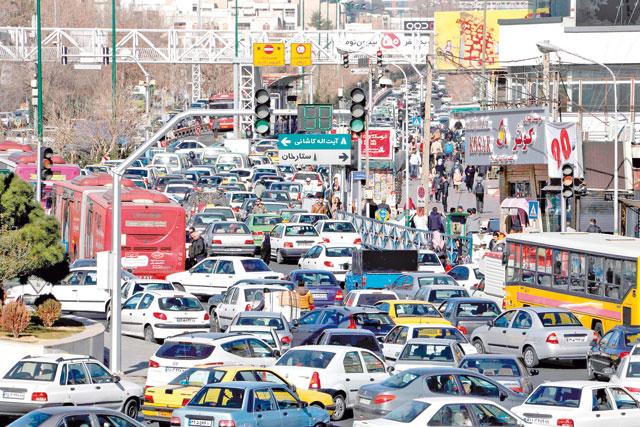You are here
Europeans reject ‘ultimatums’ from Iran as it eases nuclear curbs
By Reuters - May 10,2019 - Last updated at May 10,2019

Iranians walk through Tajrish square in northern Tehran on Wednesday (AFP photo)
BERLIN — European countries said on Thursday they wanted to preserve Iran's nuclear deal and rejected "ultimatums" from Tehran, after Iran scaled back curbs on its nuclear programme and threatened moves that might breach the pact.
Iran announced steps on Wednesday to relax some steps that restrict its stockpiling of nuclear materials in response to new US sanctions imposed after Washington abandoned world powers' 2015 accord with Tehran a year ago.
Tehran's initial moves do not appear to violate the accord yet. But President Hassan Rouhani said that unless the powers protect Iran's economy from US sanctions within 60 days, Iran would start enriching uranium beyond limits set by the deal.
"We reject any ultimatums and we will assess Iran's compliance on the basis of Iran's performance regarding its nuclear-related commitments...," read a statement issued jointly by the European Union and the foreign ministers of Britain, France and Germany, co-signatories of the deal.
"We are determined to continue pursuing efforts to enable the continuation of legitimate trade with Iran," they said, adding that this included getting a special purpose vehicle aimed at enabling non-dollar business with Iran off the ground.
In response, Iranian Foreign Minister Mohammad Javad Zarif said on his Twitter account that EU countries should uphold their obligations in the nuclear deal with Iran and normalise economic ties despite US sanctions, “instead of demanding that Iran unilaterally abide by a multilateral accord”.
The nuclear deal required Iran to curb its uranium enrichment capacity to head off any pathway to developing a nuclear bomb, in return for the removal of most international sanctions. A series of more intrusive UN inspections under the deal have verified that Iran is meeting its commitments.
Hardliners
The administration of President Donald Trump quit the agreement a year ago and reimposed US sanctions, which it has ratcheted up this month, effectively ordering all countries to halt all purchases of Iranian oil or face their own sanctions.
The move creates a dilemma for Washington’s European allies which say they share its concerns about Iranian behaviour — including a ballistic missile programme and alleged involvement in various Middle East conflicts — but think the Trump administration’s tactics are likely to backfire.
The European allies believe Trump’s campaign to isolate the Islamic Republic plays into the hands of Tehran hardliners and undermines pragmatists within the Iranian leadership who want to open the country up to the world.
French President Emmanuel Macron called on Thursday for the nuclear deal to be extended to cover other issues of concern to the West, such as Iran’s regional policies and ballistic missiles, rather than jettisoned.
“Leaving the 2015 nuclear agreement is a mistake because it is undoing what we have already done. That’s why France is remaining and will remain a part of it and I deeply hope that Iran will remain,” Macron said.
“We contributed to negotiating this deal. France at the time had even pushed for it to be more demanding than what the United States was ready to accept. It is a good deal and good base. It needs to be completed,” he said.
German Chancellor Angela Merkel said the EU wants to avoid an escalation in the dispute and Tehran must recognise that it is in its own interests to remain committed to the deal.
European countries have tried to develop a system to allow outside investors to do business with Iran while avoiding falling foul of US sanctions. But in practice this has failed so far, with all major European firms that had announced plans to invest in Iran saying they would no longer do so.
Iran has always denied that it was seeking a nuclear weapon and says it wants to abide by the nuclear deal. A spokesman for Iran’s Atomic Energy Organisation said on Thursday Tehran’s goal was to bring the agreement “back on track”.
But Tehran has also maintained that it will leave the deal, known as the JCPOA, unless it receives more economic support as envisaged by the 2015 pact.
“We have not left the JCPOA so far, but we have put such a move on our agenda and that would happen step-by-step,” Deputy Foreign Minister Abbas Araqchi was quoted as saying by state-run PressTV on Wednesday night.
Supporters of the nuclear deal, including Trump’s predecessor Barack Obama and European allies, say the pact extends the time it would take Iran to make a nuclear weapon if it decided to do so, and guarantees that it would be caught.
Lifting sanctions, they argue, would show ordinary Iranians the benefits of cooperating with the world and make it harder for hardliners to roll back reforms.
The Trump administration argues that the nuclear deal was flawed because it is not permanent, does not address Iran’s missile programme and does not punish Iran for what Washington considers meddling in regional countries.
France, led by Macron, says those issues would be easier to tackle in a future agreement if the existing deal is kept in place. Iran has always said its missile programme and regional policies are sovereign issues and not negotiable.
Trump’s hardline stance is supported by Israel and by Arab allies of the United States such as Saudi Arabia and the United Arab Emirates, which consider Iran a foe and gain leverage over global oil prices from having its exports taken off the market.
Related Articles
MOSCOW — Iran said on Saturday it would retaliate against new sanctions imposed by the United States after President Donald Trump set an ult
WASHINGTON, United States — US President Donald Trump and French President Emmanuel Macron will discuss the Iran nuclear agreement at the Wh
LONDON — Iran announced on Wednesday it was relaxing some curbs to its nuclear programme, announcing steps that stop short of violating its
















